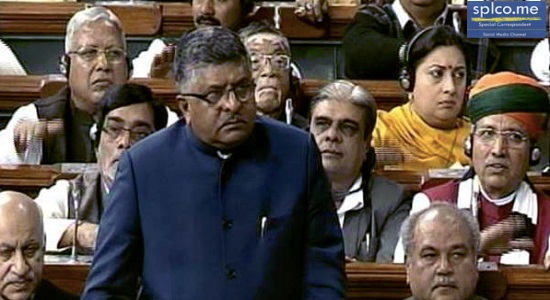The Lok Sabha passed the contentious bill making instant triple talaq illegal with up to three years in jail for the husband, a development hailed by the bjp government as "historic".

Under the law, instant triple talaq in any form spoken, in writing or by electronic means such as email, SMS and WhatsApp would be bad or illegal and void.
The bill was passed after the House rejected a string of amendments moved by various opposition members.
CPI(M) leader Brinda Karat criticised the government for attempting to push the triple talaq bill through parliament without holding any discussions or consultations with Muslim women and women's organisations.
The bill will now be sent to the Rajya Sabha for passage before it is forwarded to the President for signing it into law.
The bill is likely to sail through the Rajya Sabha, where the government lacks majority, given the Congress's stated support to the legislation.
The Congress said it supports the triple talaq bill introduced in the Lok Sabha but wants it to be strengthened to safeguard the rights of divorced Muslim women so they live a life of dignity with adequate subsistence allowance.
Earlier, the bill to make instant triple talaq illegal and void and awarding a jail term of up to three years to the husband, was introduced in the Lok Sabha amid protests by several opposition parties.
Introducing the bill, Law Minister Ravi Shankar Prasad said it was a "historic day".

But before he introduced the legislation, several opposition parties opposed its introduction saying it was arbitrary in nature and a faulty proposal.
Members from RJD, AIMIM, BJD, Indian Union Muslim League and AIADMK, who had given notice to oppose its introduction spoke against the measure.
But members from the Congress and the Left, who were also opposing it from their benches, were not allowed to speak as they had not given notice. SP leader Mulayam Singh Yadav was also seen opposing the bill.
The TMC, which had opposed the draft bill earlier, was silent.
Activists of ANHAD (Act Now for Harmony and Democracy), a non-governmental organisation (NGO), offer sweets to each other as they celebrate the tabling of the Muslim women bill.
While JPN Yadav of RJD questioned the proposed three-year jail term, AIMIM's Asaduddin Owaisi said Parliament lacks the legislative competence to pass the law as it violated fundamental rights.
He said while the bill talks only about Muslim women being abandoned, the government should also worry about nearly 20 lakh women of various religions who are abandoned by their husbands, "including our bhabhi from Gujarat".Soon after the introduction of the bill was approved, Prasad wondered whether Parliament can remain silent if the fundamental rights of women were being trampled upon. He said the legislation was not aimed against any religion but was framed to provide a sense of justice, security and honour to women.
He said the law was required as even after the Supreme Court had struck down the practice of 'talaq-e-biddat' in August, it was continuing. He claimed that as recently as today, a woman in Rampur was given instant triple talaq by her husband for getting up late.
Parliament has to decide whether the victims of triple talaq have fundamental rights or not, he said after some opposition members claimed it violated the fundamental rights guaranteed under the Constitution.
"It is a historic day. We are making history today," Prasad said.
The proposed law would only be applicable on instant triple talaq or 'talaq-e-biddat' and give power to the victim to approach a magistrate seeking "subsistence allowance" for herself and minor children.
The woman can also seek the custody of her minor children from the magistrate who will take a final call on the issue.
According to the proposed law which would be applicable to the entire country except in Jammu and Kashmir, giving instant talaq would attract a jail term of upto three years and a fine. It would be a cognisable, non-bailable offence.
Although the Congress backed the bill and asked for a few changes, senior Congress leader Salman Khurshid, a former union law minister, struck a discordant note, insisting the proposed law will be an "intrusion" into the personal lives of individuals and bring divorce, a civil issue, into the realm of criminal law.
Among other things, the 'Muslim women Protection of Rights on Marriage' Bill provides for a 3-year jail term to those found guilty of pronouncing instant triple talaq to their wives.
Congress's communications department incharge Randeep Surjewala said Parliament must ensure the protection of rights of Muslim women and children under all circumstances.
He said the Congress was the first political party to welcome the Supreme Court verdict banning triple talaq, and had hailed it as a decisive step towards women empowerment and victory for the rights of muslim women.
"The Congress has always believed that the issue of instant triple talaq 'Talaq-e-biddat' is about gender justice and gender equity. The Congress will support any and every law abolishing instant triple talaq.
"The present bill needs to be strengthened to safeguard the rights of women to a life of dignity with adequate subsistence allowance. Parliament must ensure protection of rights of Muslim women and children under all circumstances," he said.
Khurshid, however, said, "It is an intrusion into the personal lives of individuals. Taking criminal law into the family, you have to be careful. To make divorce in any form a criminal matter is unacceptable anywhere in the world." Khurshid, also a Supreme Court lawyer, said divorce or consequences of divorce, are areas of civil law and not criminal law, which comes in only when there is violence.
"Criminal law is kept out of family as far as possible, which is a general policy everywhere. Why are we bringing criminal law into something which is a non-existing factor? Triple talaq is no institution or institutional fact of life, the Supreme Court has made it very clear," he said.
All Muslim women's groups have asked an obvious question as to who will pay the maintenance and subsistence allowance once the husband is in jail, he said.
The Congress leader also asked whether such a woman and her children would have the right to proceed against the estate movable and immovable property of the husband, as the proposed law does not provide for it.
"Where no such property exists or the property is owned by more than one stakeholder or is under mortgage/charge, does it mean that women and children would then have no maintenance?" he asked.














